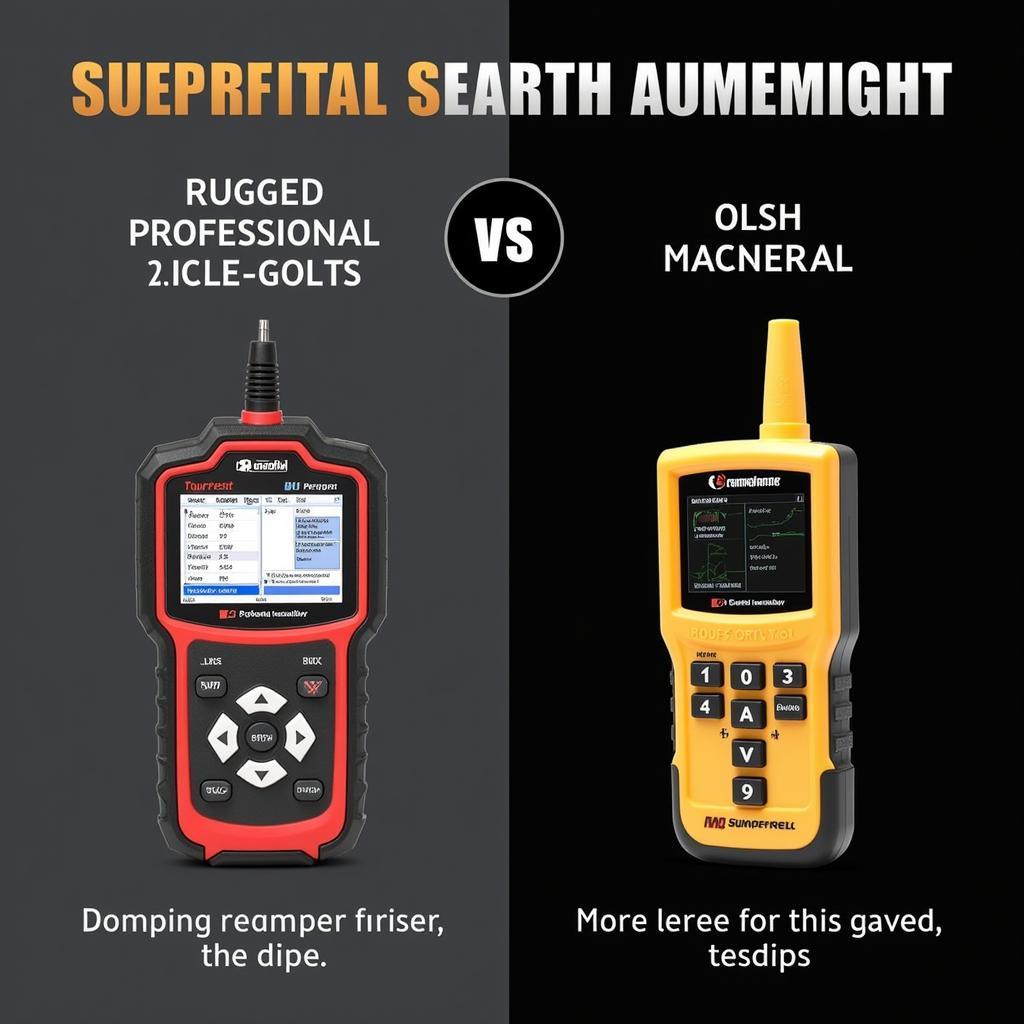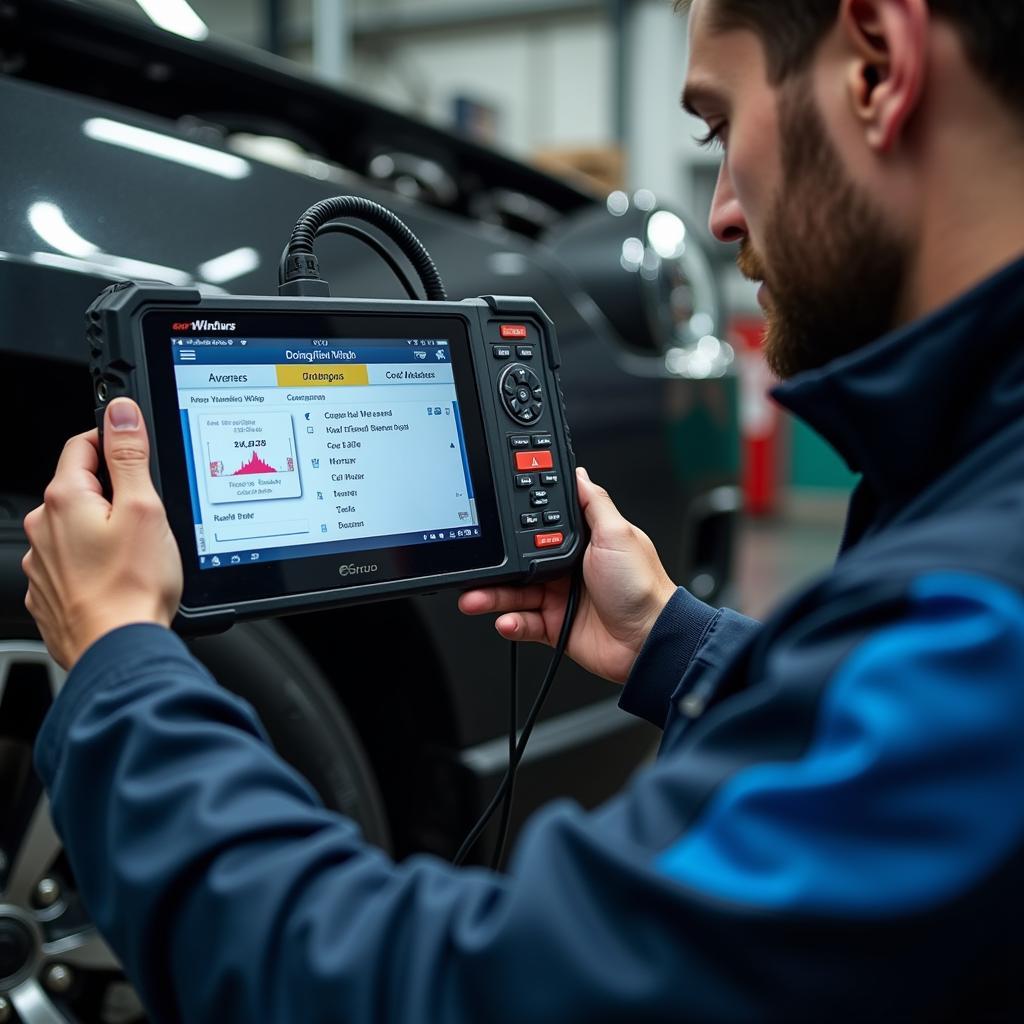Understanding the cost of new car diagnostic tools is crucial for both professional mechanics and DIY enthusiasts. Whether you’re a seasoned technician or just starting out, finding the right diagnostic tool at the right price can be a game-changer. This article dives deep into the factors influencing the cost of these essential tools, helping you make an informed decision.
Choosing the right diagnostic tool can significantly impact your ability to quickly and accurately diagnose car problems. Let’s explore the world of car diagnostic tools and discover how to find the perfect fit for your needs and budget. Many mechanics are looking for an arsenal of car pricing tools and calculators.
Factors Affecting the Cost of New Car Diagnostic Tools
Several key factors contribute to the price tag of a new car diagnostic tool. Understanding these factors empowers you to choose a tool that aligns with both your budget and your diagnostic needs.
Software Capabilities and Features
The software included with a diagnostic tool significantly impacts its price. Advanced features like bidirectional control, live data streaming, and access to manufacturer-specific information often come at a premium. Basic code readers are naturally more affordable, while high-end scan tools with comprehensive software suites command higher prices.
Vehicle Coverage and Compatibility
The range of vehicles a diagnostic tool can work with also affects its price. Tools that cover a wide range of makes and models, including both domestic and foreign vehicles, tend to be more expensive than those designed for specific brands or a limited number of car models.
Hardware Quality and Durability
The physical construction of the diagnostic tool plays a role in its cost. Durable, rugged tools built to withstand the rigors of a professional workshop environment often cost more than less robust options. Consider the tool’s construction, screen size, and overall build quality when evaluating the price.
 Comparing Diagnostic Tool Hardware Durability
Comparing Diagnostic Tool Hardware Durability
Brand Reputation and Support
Established brands with a reputation for quality and excellent customer support often price their products higher. This premium reflects the brand’s investment in research, development, and ongoing support. Consider the value of brand reputation, especially if you anticipate needing technical assistance or software updates.
Additional Features and Accessories
Extra features like wireless connectivity, Bluetooth capabilities, and included accessories such as adapters and cables can influence the overall cost. Evaluate which features are essential for your diagnostic needs and weigh their value against the added expense.
How Much Should You Spend on a New Car Diagnostic Tool?
The ideal price range for a new car diagnostic tool depends largely on your individual needs and usage. Here’s a general breakdown:
Budget-Friendly Options:
Basic code readers can be found for under $50 and are suitable for DIY enthusiasts looking to read and clear basic diagnostic trouble codes (DTCs). These tools are a good entry point but offer limited functionality. If you’re thinking about buying a new car, you might want to check out a new car price comparison tool.
Mid-Range Options:
For more advanced features and broader vehicle coverage, expect to spend between $100 and $500. These mid-range tools often offer live data streaming, some bidirectional control, and more comprehensive code definitions.
High-End Professional Tools:
Professional-grade scan tools with extensive capabilities and wide vehicle compatibility can range from $500 to several thousand dollars. These tools offer the most comprehensive diagnostic features and are essential for professional mechanics. Tools such as the peleustech inpa k can k dcan car diagnostic tool cable can provide deep diagnostic capabilities.
 Mechanic Using a Professional Diagnostic Tool
Mechanic Using a Professional Diagnostic Tool
What are the Different Types of Car Diagnostic Tools?
Understanding the different types of car diagnostic tools available will further aid in your decision-making process.
Code Readers
Code readers are the most basic type of diagnostic tool, primarily used to retrieve and clear DTCs. They are affordable and user-friendly, ideal for DIYers.
OBD-II Scanners
OBD-II scanners offer more functionality than basic code readers, including live data streaming and access to freeze-frame data. They provide a more in-depth view of vehicle systems.
Professional Scan Tools
Professional scan tools are the most comprehensive and expensive option, offering advanced features like bidirectional control, programming capabilities, and access to manufacturer-specific data.
“Investing in the right diagnostic tool can significantly boost your efficiency and accuracy in diagnosing car problems,” says John Smith, Senior Automotive Technician at Acme Auto Repair. “It’s an investment that pays for itself in the long run.”
Conclusion
The cost of a new car diagnostic tool is influenced by a variety of factors, ranging from software capabilities to brand reputation. By understanding these factors, you can make a smart investment in a tool that meets your specific needs and budget. Whether you’re a DIYer or a seasoned professional, choosing the right diagnostic tool is essential for accurate and efficient car repair. Don’t forget to research and compare options before making your final decision, ensuring you get the best value for your money. Thinking about long-term healthcare? Maybe you should also look at a long term health care nsurance comparison tool. Or if you’re interested in electric vehicles, there’s an electric car comparison tool available as well.
FAQ
- What is a diagnostic trouble code (DTC)?
- What is the difference between an OBD-II scanner and a code reader?
- Do I need a professional scan tool if I’m a DIYer?
- How often should I update my diagnostic tool’s software?
- What are some reputable brands of car diagnostic tools?
- What is bidirectional control, and why is it important?
- Can I use a diagnostic tool on any car?
Common Scenarios
- Check Engine Light: A diagnostic tool can help identify the cause of the check engine light illuminating.
- Performance Issues: Diagnosing issues like rough idling or poor fuel economy often requires a diagnostic tool.
- DIY Repairs: Diagnostic tools empower DIYers to diagnose and fix simple car problems themselves.
Further Exploration
Explore DiagFixPro for more in-depth reviews and comparisons of various car diagnostic tools. You can also find articles on specific diagnostic procedures and troubleshooting guides.
For assistance, contact us via WhatsApp: +1(641)206-8880, Email: [email protected] or visit our office at 910 Cedar Lane, Chicago, IL 60605, USA. Our customer support team is available 24/7.

Leave a Reply